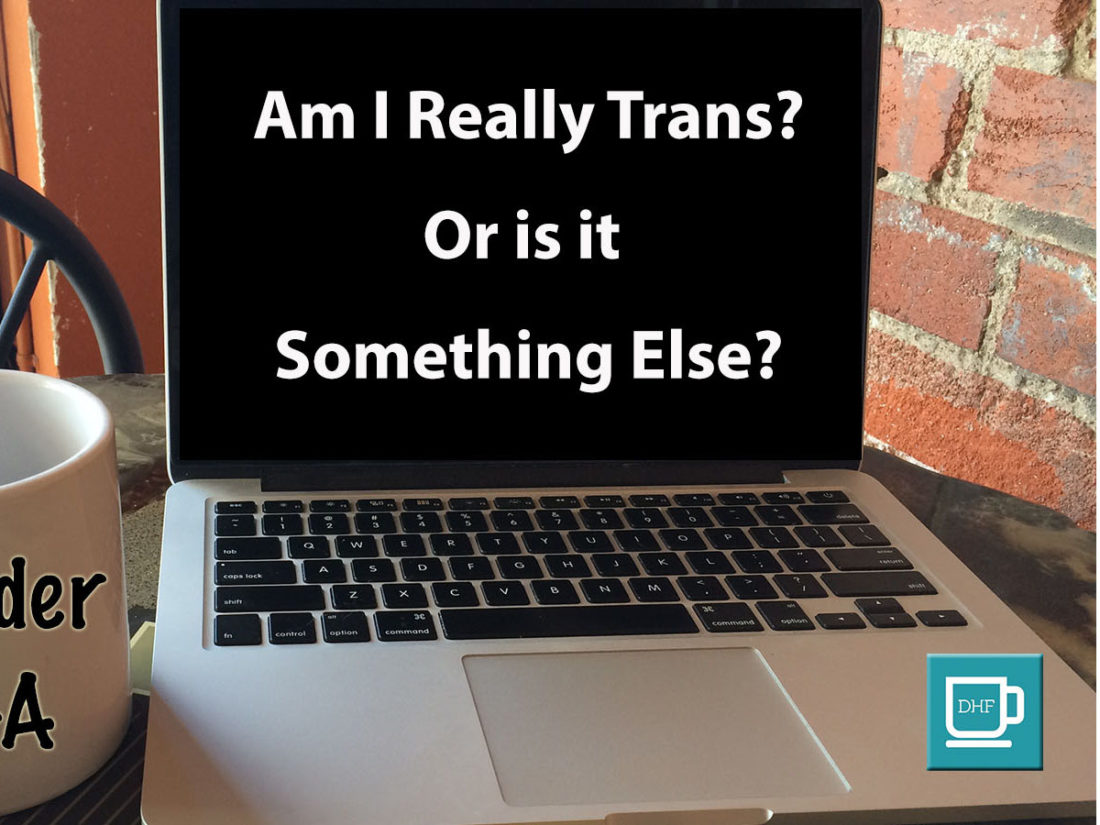
Reader Q&A: “Am I Really Trans? Or is it Something Else?”
This week I received several letters in which each writer was struggling with the same question:
Am I really trans? Or is it something else?
Here are examples of what the writers felt that “something else” might be:
“Or do I have OCD?”
“Or am I a gay man?”
“Or is this a fetish?”
“Or is it peer pressure?”
“Or is it my bipolar disorder?”
Dear Readers,
First and foremost, please know that you are not alone! Asking yourself if you are a “really trans,” followed by a list of all the others things it could be instead, is one of the most frequent conversations brought up by my counseling clients during their gender identity journey.
First, let’s talk about why this line of questioning happens so often for someone who is exploring their gender identity.
More than likely you were taught at a young age that you gender identity was either male or female. This assumption of your gender was based on the appearance of your genitals. That’s it. (1)
Even if you conveyed uncertainty or resistance to your assigned gender at birth, you were instructed to “Please stick with what we said your gender is, thank you very much!” Some of you may have been told this subtly, perhaps even with a dose of (what we now know is) ignorant helpfulness (“Oh sweetie, you’ve made a mistake, you need to stand in line over there with the other boys—this is the girls’ line”).
For others, you were scolded, even punished, for expressing yourself in ways that appeared to be outside of the “norm” for your assigned gender at birth (“What do you think you’re doing?! Stop walking/talking/acting like that!”).
Now that you are searching for the truth about your gender, it’s going to take a while to sift through all of the confusion and shame that has built up over the years.
Your truth is still there inside of you! It’s just going to take some work to get to it.
This best way to discover this truth is to individually examine each of your questions of “… is it really this?”
This will help you approach the bigger question of “Am I transgender?” one layer at a time, instead of feeling overwhelmed by all of your questions at once. It will help reduce what therapist and transgender educator Aydin Olson-Kennedy refers to as “gender noise,” enabling you to hear what your inner voice has been trying to tell you all along. (2)
Think of it as you being a detective, seeking out clues to solve the mystery of who you truly are.
Let’s walk through an example as to how this works.
One of the letter writers wondered if they were “really transgender” or if it is a symptom of having what they suspect to be is undiagnosed OCD (Obsessive Compulsive Disorder). I’ve heard from others who have had similar questions about themselves, listing diagnoses such as Bipolar Disorder, Borderline Personality Disorder, Generalized Anxiety, and Major Depressive Disorder.
It’s understandable that this would come up as one of the “… is it really this?” questions needing to be dissected. A person having gender identity confusion can experience symptoms such as depression, anxiety, mental confusion, mood swings, and obsessive thinking. If you discover there are mental health conditions that have the same symptoms that you are experiencing, no wonder you’re not sure if that’s what’s really going on as opposed to gender identity confusion. Or wait, maybe it’s both!
So what’s the best way to discover the truth of this “… is it really this?” layer?
Address this specific question by seeing a professional who can work with you on exploring, diagnosing and, if necessary, treating any conditions that are separate from your gender identity confusion. (3)
This can be a mental health counselor who is skilled at diagnosing, a psychologist, a psychiatrist, or a combination of professionals (including your physician, naturopath, etc.).
With the help of these professionals you might discover:
- You do not have any of the mental illnesses you were wondering about, and that the symptoms you are experiencing are a result of repressing your gender identity, as well as the stress associated with bringing this to light.
- That you have a mental illness that is separate from the stress caused by gender identity confusion. Therefore you and your professional(s) decide to treat it to see if you experience any relief from its symptoms.
With your answer in hand, you can continue to explore your gender identity questions with more clarity now that you have more information about this layer of “…is it really this?”
Here are a few more tips to keep in mind as you explore your layers of “…is it really this?” (4)
- Watch for internalized transphobia. You’ll know you are experiencing this if you can hear the voice of a “internal bully” that criticizes, condemns, and shames you into believing that you might not be transgender.
- Seek out counseling. If you can’t access counseling, find someone you can talk to who can remain neutral and unbiased as you unravel your various layers.
- Give it time. It can be difficult to have patience through this process, so allow yourself the time and space to do so. In the end it will help you feel more certain about your conclusions.
- Don’t shoot for 100% certainty. Instead, work on increasing your amount of certainty to a level that is high enough for you to take the next step in your gender identity discovery.
- This doesn’t happen in a vacuum. As you examine your “…is it really this?” questions, your gender identity will continue be on your mind. Allow this to happen—the key is to minimize the feeling of being overwhelmed by having too many questions come up at the same time with too much intensity.
- This is a holistic discovery process. What you learn about each of your “…is it really this?” layers is going to impact you as a whole. Pay attention t0 how each of your answers affects your gender identity journey, as well as your entire identity.
Lastly, I posed this question to the Conversations with a Gender Therapist Facebook community and received advice from others as to how they navigated their own “…is it really this?” questions.
Question from a reader: How do you know that you are really trans, and that it’s not something else? “Am I a woman? Or…
Posted by Conversations with a Gender Therapist on Monday, October 10, 2016
Hope this helps!

(1) For those born with the intersex condition, there’s a good chance a decision was made to “correct” your genitals to reflect either that of a male or female, and once again you were told which gender you were then assigned.
(2) https://theacademy.sdsu.edu/pcwtabios/aydin-olson-kennedy-msw-acsw/
(3) If at all possible find a professional who is educated around what are the symptoms of gender identity confusion. This will enable them to differentiate between those and the symptoms of specific mental illnesses, increasing your chances of receiving an accurate diagnosis.
(4) I discuss this topic in greater depth in my book You and Your Gender Identity: A Guide to Discovery, which you can order here.





Sharon Anne
December 28, 2016 at 5:38 PM**
I was born in 1956; I began transition in 1974. Times were quite different then compared to today – some for better, some for not so much.
The child knows. The child acts with insistence, consistence, and persistence.
I knew my gender identity at least by age 3. My ‘feminine protesting’ tantrums did not persuade my family that I knew that something was wrong; they perceived me as misbehaving.
**